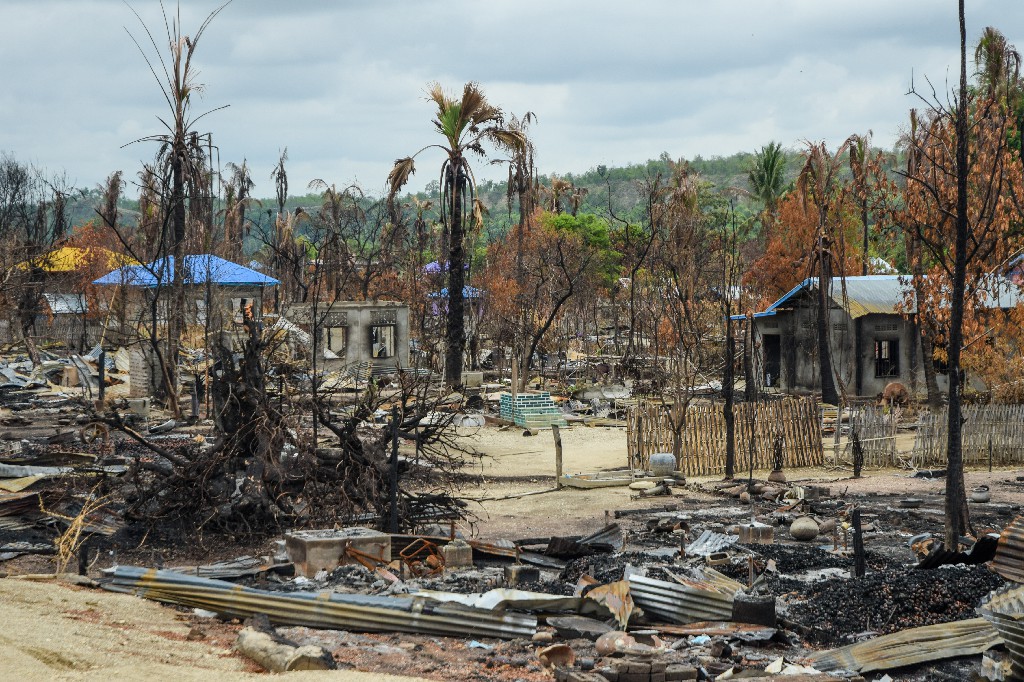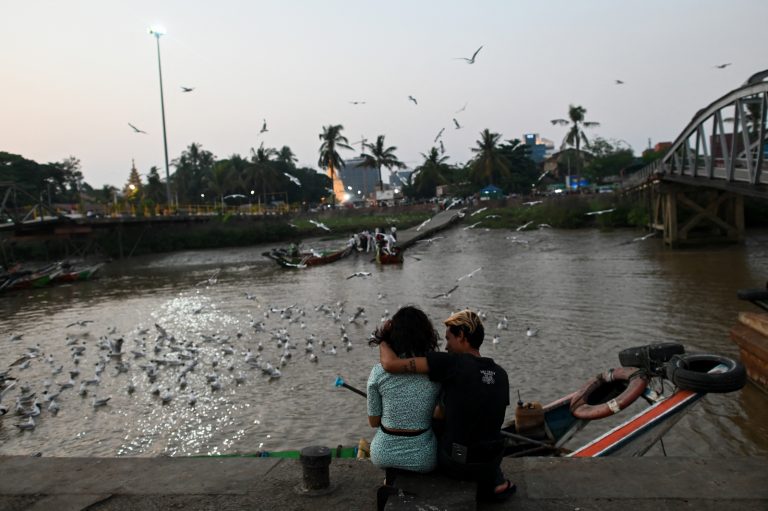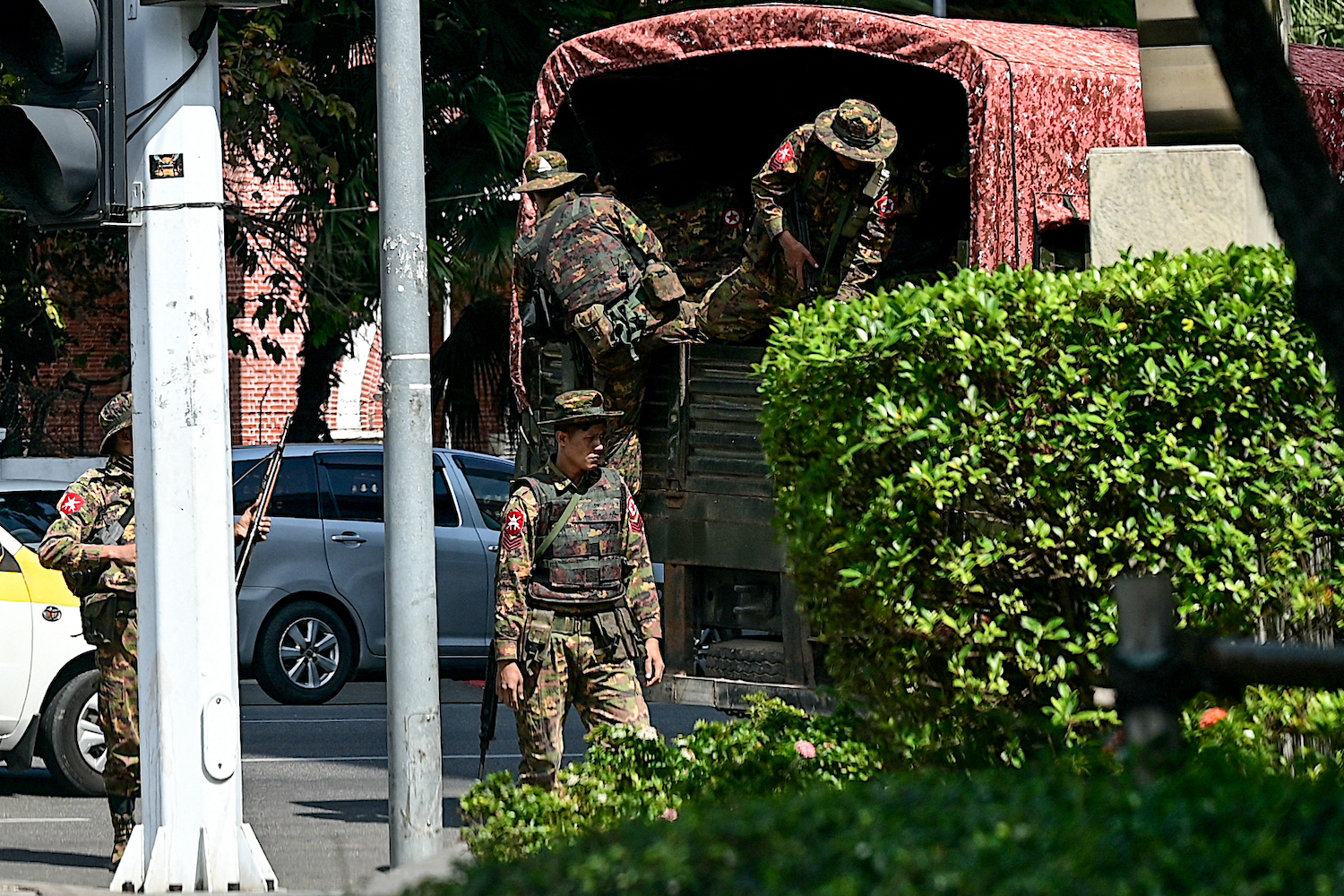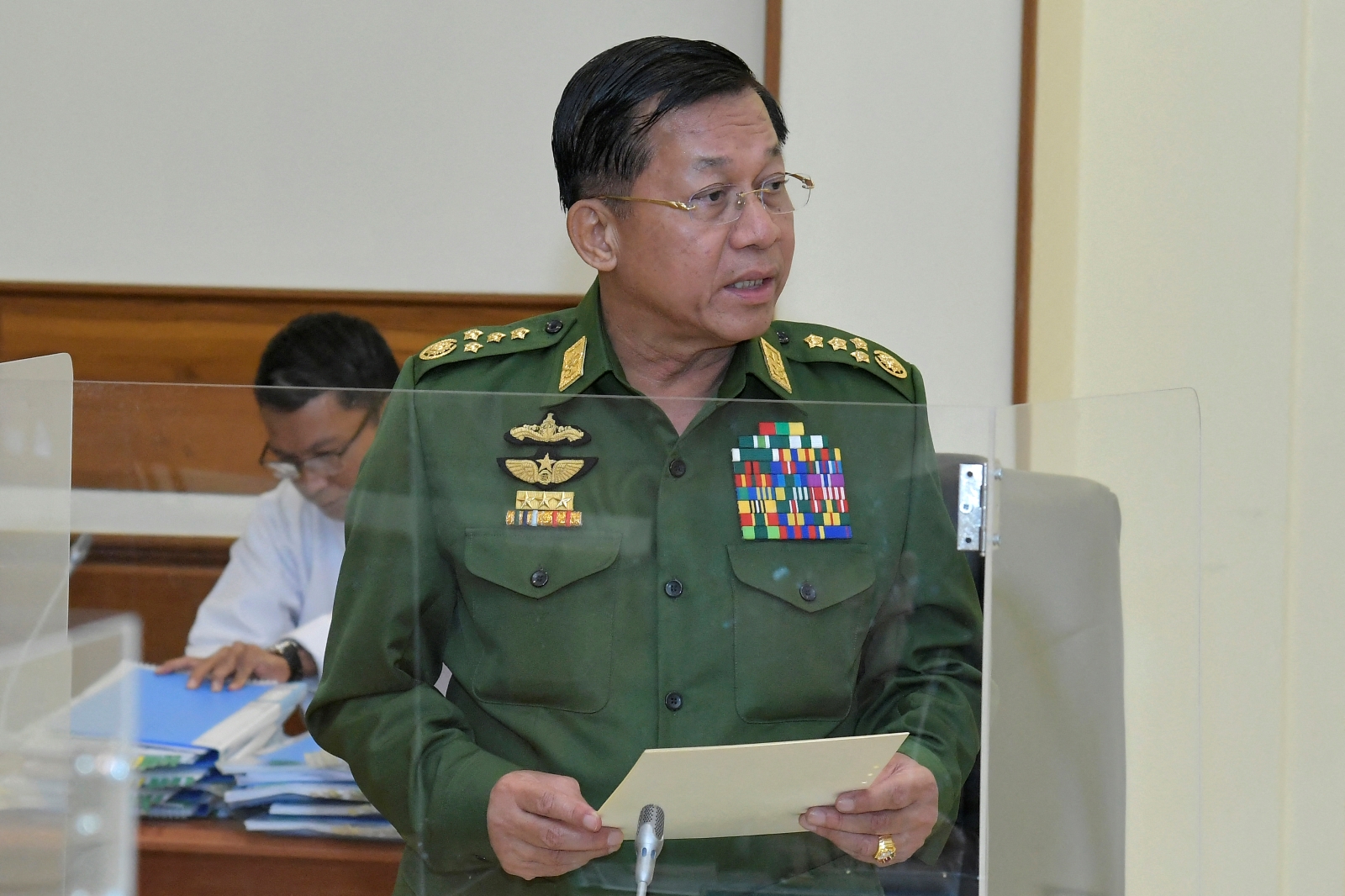The traumatised victims of a blaze that destroyed most of a central Myanmar village have been left reliant on donations as they try to rebuild their lives and salvage shattered dreams.
By FRONTIER
On the afternoon of June 15, Ko Myo Thiha Kyaw watched with friends and neighbours from a hilltop in Magway Region’s Pauk Township as the village of Kinma was consumed by an inferno.
When the soldiers and police overseeing the blaze spotted the group of villagers, they opened fire, recalled Myo Thiha Kyaw, 19. As they ran for their lives, one of Myo Thiha Kyaw’s young friends was hit in the thigh by a bullet that shattered his femur.
Villagers cared for the boy in the forest overnight and sent him to the government hospital in Pauk the next day. Shortly after, the police arrived at the hospital and arrested the boy. He remains in custody, and his condition is not known.
“After my friend was arrested, the police learned that I was with him while we watched our village burning,” Myo Thiha Kyaw said.
Regime forces soon began looking for Myo Thiha Kyaw as well. At around 8pm the following day, June 16, he was arrested in the forest near Kinma village, where he had taken refuge with his older brother and neighbours. He said he was handcuffed and taken by car to the Pauk Township police station, without being told why he had been detained. When they reached the police station, the Pauk Township police chief, Police Major Hla Maung, punched him in the face and chest.
Myo Thiha Kyaw said he was interrogated overnight by the police, who wanted to know if he was linked to the People’s Defence Force. He was released the next day without charge.
Frontier interviewed Myo Thiha Kyaw in Kinma village on July 7, three weeks after the village was destroyed in a fire. He said the tragic series of events on June 15 was sparked by a regime raid targeting a local PDF.
“There was some shooting, and then police and soldiers entered the village. The PDF fighters had already left. The police and soldiers started setting fire to houses in the northern part of the village. It was they who set the fires, no one else,” he said.
Blaming ‘terrorists’
Although Pauk Township is in what’s known as the central dry zone of Myanmar, Kinma is surrounded by dense forests and has a cooler climate. The 25-kilometre journey from Pauk to Kinma takes about two hours by motorcycle, passing through around half-a-dozen villages.
The road to Kinma includes a climb up the slopes of a mountain called Kyi Ngo Taung that dominates the landscape, and which has been the site of several clashes between junta forces and an armed resistance group that calls itself the Southern Pauk Guerrilla Force (SPGF).
Kinma is at the foot of the mountain. A small village of around 250 homes, the houses and shops are clustered along a main road that runs north-south.
Today, that road is lined with burnt trees and piles of ash rather than buildings. When Frontier visited, the smell of burnt materials was noticeable even before entering the village.
On the morning of June 15, regime forces approached Kinma village from three directions in an operation targeting the SPGF. A convoy of trucks carried dozens of soldiers and police along the Pathein-Monywa highway, and dozens more police arrived from outposts at Kaing Lal and Yay Pya villages, according to residents.
The SPGF, which is part of the larger Pauk People’s Defence Force, attacked regime forces about three kilometres east of Kinma village at around 10am. Using landmines, rifles and home-made traditional hunting guns, it claims to have killed at least 10 soldiers and police in the attack.
Eventually, the SPGF was unable to withstand the superior firepower of the regime forces. After 30 minutes of shooting, its members retreated and the police and soldiers then proceeded to Kinma village. Most residents of Kinma had already fled to nearby forests and farmland after hearing the fighting.
“We are no threat to them. We didn’t resist. We had already fled the village because we were afraid, but they still burned it down,” said Kinma resident U Win Bo, 55.
The fire reduced around two-thirds of the village to ashes, according to a village committee formed after the fire to receive and distribute aid to those impacted by the fire, and also claimed the lives of two elderly residents who did not flee when regime forces arrived. More than half of the village’s 2,000 residents were left homeless and have had to camp in nearby forests or on farmland.
Despite the eyewitness accounts that junta forces were responsible for the fire, state-run MRTV blamed it on “terrorists”. Media reports that blamed the arson on regime forces were “deliberately plotting to discredit the military”, it said, claiming that soldiers and police had tried to extinguish the fire.
Kinma residents, including members of the village committee, said they believe that their community was burned down in revenge for the casualties regime forces have suffered in the fighting around Kyi Ngo Taung, and the targeted killings of perceived regime sympathisers.
U Nyo Chaw, an organiser in Kin Sote village for the military-linked Union Solidarity and Development Party, was killed on May 25, and U Aye Lwin, a clerk at the General Administration Department office in the village, was killed five days later. The SPGF claimed responsibility for both killings.
“The blaze in our village is related to the execution of the two informers and the battle on Kyi Ngo Taung. The blaze destroyed everything we have worked for all our lives in a few hours,” said U Win Naing, 48, a farmer and father of five who is on the village committee.
On the day of the fire, Win Naing fled to the forest with his wife, five children and elderly parents. When he returned to Kinma, he found not only his home destroyed but also the barn in which he had stored his harvest.
“I have suffered a lot; the fire shattered all my hopes,” he told Frontier. “Four of my children have been outstanding achievers at school; two are at university and the other two have passed their matriculation and are trying to attend a training course to get jobs in Japan. I have to give them a lot of support for their future, but now I have nothing at all,” he said.
Asked about regime propaganda blaming “terrorists” for the fire, Win Naing said it could only have been soldiers and police.
“[Military-run] Myawaddy TV said the fire started from a blaze in the high school set by the PDF, but as you have seen, there was no fire at the school,” he said.
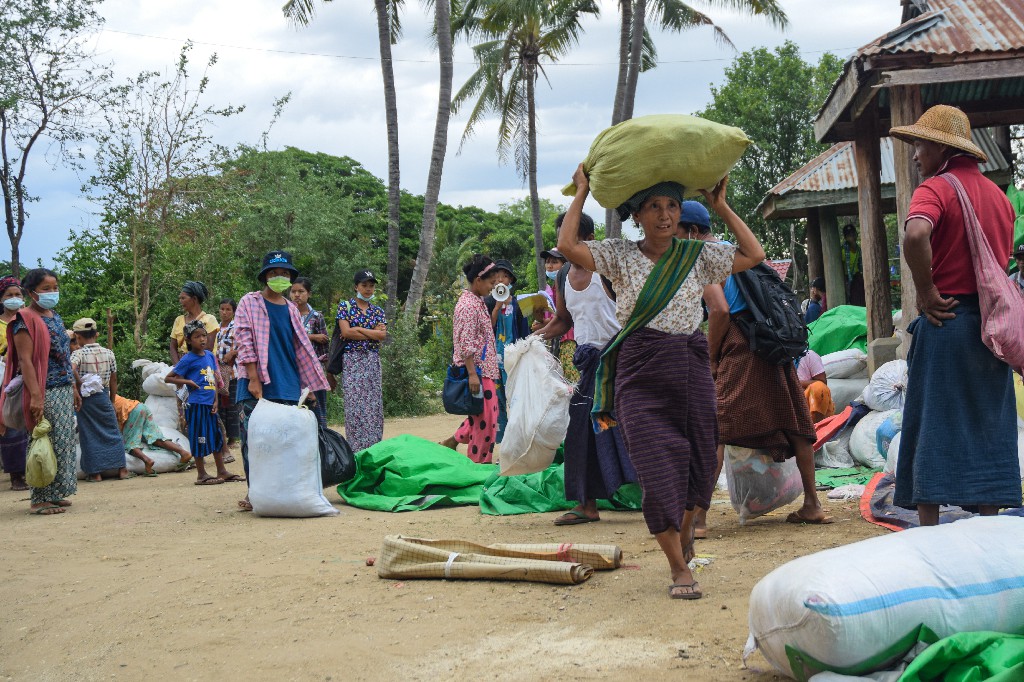
Relying on donations
When Frontier first met Win Bo, he was searching through the ashes where his house once stood. Eventually he found what he was looking for, plucking an iron stand from the ruins.
Win Bo said he would use it to make a wood-burning stove for cooking at the tent in the forest where he was living with his wife and their two teenage daughters.
“I have no idea why they burned down the village,” he said.
Win Bo and his family lost their house and a barn in which they had stored rice, peanuts and onions. Like other homeless villagers, they are living off donations distributed by a village committee formed after the fire.
Kinma’s only monastery is being used as a distribution site, and many villagers gather each day to receive cash and clothes. After spending a few hours in the compound of the Dhamma Thukha monastery, where some take their meals, the villagers return to their temporary shelters in the forests and the fields. The burned areas of the village have basically been abandoned, as many fear staying in the village in case the soldiers or police come back.
“We have to rely on donations to keep ourselves alive. We don’t want to live in the forest any longer. We just want to get our houses and property back,” he told Frontier.
The village committee receives donations from social service groups, charities and individuals, but members told Frontier they expect donors will soon forget about Kinma or be unable to provide support due to their own financial hardships.
To ensure a steady supply of food, the committee is planning to plant paddy.
“If we can’t grow anything, we will face big trouble next year,” said a committee member who asked not to be identified due to fear of reprisals.
The yield from paddy grown at Kinma is among the best in the area and other villages rely on it as a source of the cereal. The village is also renowned as the producer of a prized rice species known colloquially as namathalay. However, farmers won’t be growing that variety next season because the fire destroyed the village’s precious stocks of namathalay seeds.
The village committee said it was yet to calculate the total damage caused by the fire as its priority has been meeting the needs of residents for food, medicine, clothing and other necessities. However, the damage is likely to total billions of kyat.
Daw Khin Swe Oo, 42, a farmer with two daughters, who had a barn and harvesting machinery destroyed by the fire, estimates her losses at more than K50 million (US$30,400).
When Frontier met Khin Swe Oo in Kinma she was choosing something to wear from bags of used clothing donated by people around the country. The next day, at the tent she has set up on farmland near Kinma, she seemed happy to not have to worry about clothing.
“I have 15 outfits and we have rice. But living like this in a cramped tent is not easy. We have no curry or other dishes and all we have to eat is rice with ready-made balachaung [a spicy shrimp paste condiment] or fried potatoes,” she said.

‘I should have taken them away’
The elderly couple who perished in the fire, U Mya Maung, 87, and Daw Kyi Mhein, 85, are survived by three children. U Han Win Kyi, 57, lived with his parents, while his younger brother, U Myint Maung, 50, and their sister, Daw Khin Win Kyi, 63, both lived elsewhere in the village.
Mya Maung suffered a stroke about two months before the fire and could not walk. Kyi Mhein, who had badly broken her femur years ago and had a metal plate inserted, walked with a limp.
After hearing the sound of fighting near the village on the morning of June 15, Myint Maung rushed to tell Han Win Kyi to flee with their parents. However, Han Win Kyi had not finished feeding and bathing his father yet, delaying his departure.
“My mother told me to leave them and run because soldiers were entering the village,” recalled Han Win Kyi.
“She thought the elderly would be safe, and it was only young people who were in danger. I should have taken them away in a cart,” he said, showing the metal plate he had recovered from his mother’s remains.
Khin Win Kyi said she and her brothers did not think that regime forces would set the village on fire. Soldiers and police had been coming to Kinma regularly since late May, when the Tatmadaw first clashed with the newly founded Southern Pauk Guerilla Force on and around Kyi Ngo Taung mountain. They had no reason to think most of the village would be burned to the ground.
The three children believe their mother could have escaped but made a deliberate decision to stay with her husband.
“It seems that our mother chose to die together with our father,” a weeping Khin Win Kyi told Frontier.
‘Crime against humanity’
The torching of Kinma by regime forces has been widely denounced, including by the National Unity Government, which described it as a “crime against humanity” at a June 25 press conference.
At the conference, NUG Minister for International Cooperation Dr Sasa also said that the incident would be used as evidence in a case against the junta being prepared for submission to the International Criminal Court.
“We need to file evidence of not only this case but also similar incidents, for example, what happened to Rohingya villages or in Chin State. We are working systematically on this process,” Sasa said.
Pyithu Hluttaw MP-elect for Pauk Township, U Ye Tun Win, said human rights abuses such as what happened in Kinma have long been committed by the military in ethnic areas.
“This is the first time that we people in the [Bamar heartland] have had such an experience. The people are starting to realise that the military is evil, which they did not believe before. Burning the village is not abiding by any sort of law or ethical behaviour. It is a reprehensible incident,” Ye Tun Win said.
Win Naing, who is also a member of the Kinma village committee, said that watching the police and soldiers burn their homes to the ground changed the way he viewed regime forces. “At the time I still regarded them as human beings,” he said, “but after they burned down the village, I no longer consider them to be human – they are just animals.”


